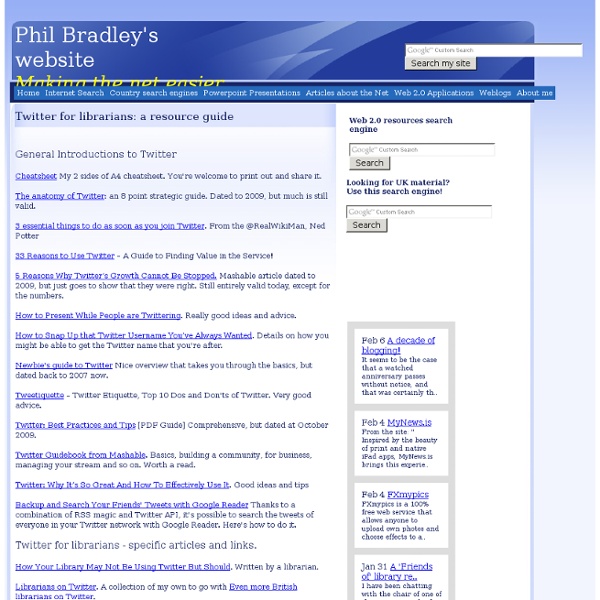



70 outils indispensables pour Twitter Cet article a été publié il y a 4 ans 11 mois 23 jours, il est donc possible qu’il ne soit plus à jour. Les informations proposées sont donc peut-être expirées. Cet article n’est que la première partie d’une série consacrée aux “outils du web”, une suite d’articles destinée à rendre votre web plus “agréable” ! Social Media 'Etiquette' in the Workplace Twitlonger Over 100 ideas for using Twitter in the Classroom This handful of resources provide about 100 different ideas for, and examples of, using Twitter in the classroom. It’s been almost 8 months since I published the post, “6 Examples of Using Twitter in the Classroom”, about uses of the popular micro-blogging tool in the instructional setting. This post generated a lot of traffic, and continues to attract hundreds of viewers every week. Since that brief posting, I’ve come across a lot of articles containing examples and suggestions for using Twitter in instructional applications. Here we have 25 Ways to Teach with Twitter from Sonja Cole.Here’s 10 great ideas on how to use Twitter in the classroom, from blogger Steve Wheeler.This extensive list provides 50 ways to use Twitter in the College Classroom.This Twitter for Academia post suggests 13 different ways to use Twitter in the classroom.Lastly, this PDF file discusses the experience of teacher Ana Dominquez using Twitter in the Kindergarten classroom. About Kelly Walsh Print This Post
10 Commandments of Twitter - Do Your Job Better By Katrina Gulliver Most of my friends (the ones who are not already on Twitter) have heard my Twitter pitch, and it's true that since joining several years ago I've become quite an evangelist. Recently over dinner, a colleague told me he had never really gotten the point of Twitter, but now that he had a book to promote, he wished he had followers he could share it with. Twitter is what you make of it, and its flexibility is one of its greatest strengths. The first and most obvious benefit has been helping me get to know a lot of great people whom I probably wouldn't have met otherwise. Thanks to Twitter, I have been sent copies of obsure articles much faster than I would have received them from an interlibrary loan. It's important to have a keyword, or hashtag, that others can search for when you want to communicate with networks beyond your own followers. A common error I see some academics make on Twitter is to set up an account solely to promote a new book or project. 1. 2. 3. 4. 5.
Five indispensable lessons for Twitter success It’s hard to believe but my three year Twitter anniversary is approaching so I’ve been reflecting on this channel and what it has meant to me. I know this may sound bold but it’s undeniable that Twitter has changed my life. I’ve learned so much and discovered wonderful people who have become great friends, collaborators and business partners. So in a celebratory toast to this incredible little tool, here are five indispensable lessons for success on Twitter: 1) Numbers matter … sort of. 2) Content is power. 3) Bury the sale. 4) Re-frame the experience. 5) Show up, don’t show off. How To Build A Great Twitter Reputation And Get More Followers And Retweets If you can answer “yes” to any of these questions, then this article is for you. Want more followers and retweets?New to Twitter and want to make it useful for you?Twitter isn’t working as well as you’d like it to? The three steps to a great Twitter reputation are content, style and connections. First—because this is what makes you really popular—we’ll cover making connections and building your account. Second, we’ll work on creating tweets that will give people something to retweet, and help people get to know you and want to recommend you. Your tweets are the core to your reputation. Third, we’ll work on your Twitter style. Ready? Begin by searching for people to engage with by topics that interest you. Add users that you find and are considering to Twitter lists, so you can watch how they tweet for awhile. You’ll want to follow very few key people at first, because you’ll want to have time to devote to them once you follow them. 1. 3. And don’t forget to spread out your tweets! 1. 2. 4.
Why Teachers Shouldn't Friend Students on Facebook & Social Media Sites The Importance of Social Media I have nothing against social networking sites. In fact, I believe that they have a very important and positive role to play in schools. They are an ideal platform to educate children on the merits of being responsible digital citizens. However, some educators are denouncing this bill as anti-social media. It states, "No teacher shall establish, maintain, or use a nonwork-related internet site which allows exclusive access with a current or former student." So, what about work related sites? As a profession, teaching is now more open and transparent than it ever has been.